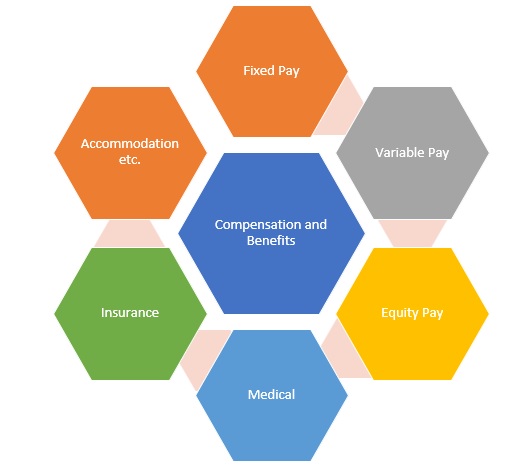- Business Concepts ›
- Human Resources (HR) ›
- Compensation & Benefits
Compensation & Benefits - Definition, Importance, Types & Example
This article covers meaning & overview of Compensation & Benefits from HRM perspective.
Compensation & Benefits Definition
Compensation and benefits is the overall compensation/salary structure with other monetary and non-monetary benefits passed on by a firm to its employees in return for their services. Compensation and benefits is an important aspect of HRM as it helps to keep the workforce motivated are the most important hygiene factors. It helps give benefits to employees based on their performance and actions and brings the best out the employees at workplace. It is one of the core hygiene factors for the employee as well as the company.
Importance of compensation and benefits
Companies hire people individual to achieve their organizational goals and people join companies to earn money & build their career. One of the biggest factors why people join companies in the compensation and benefits, salaries, perks, incentives etc. which is given to them. Apart from the company's reputation and job profile, the money offered as a salary is pivotal in attracting people to work for the organization.
The more the compensation and benefits offered to employees, the more is their loyalty, motivation to work and do well.
However, companies which offer lesser salaries see a high attrition rate and less productivity from employees. All these factors help in making compensation and benefits an important factor in managing workforce. Salaries of employees are defined by several parameters like experience, education background etc.
In senior management, skills like team management, communication management, leadership, time management etc. are also considered while finalizing the pay package.
Compensation and benefits components
There are several components in the overall compensation and benefits plan of an employee. There can be several ways where benefits can be given to employees.
Mostly it is given in terms of a CTC or gross salary.
Some of the various components of compensation and benefits are mentioned below:
1. Fixed pay
This is the basic salary plus other fixed components paid to the employee irrespective of any other factor. This is stated clearly in the employment contract. This is the compensation or salary or wage which an employee or a worker will definitely get as long as he or she is an employee of the company.
Fixed pay is mostly the largest component of the compensation and benefits package offered by an organization to an employee.
2. Variable Pay
This is the additional compensation paid to employee based on employee’s performance, company performance etc. Since variable pay is based on the performance of an individual, it motivates the employees to perform even better.
3. Equity Pay
Employees are awarded shares of the company, often at a discounted price. Employees are expected to make money out of them by the appreciation of the stock price and the growth of the company.
This is mostly given to the senior management who have served the company for a long time.
4. Medical
Medical is part of the compensation package for most of the companies now. Medical includes the health insurance, free checkups, medical facilities on campus etc. which keeps the employees safe as well as motivated.
It covers health insurance for the employees, dependents with option to extend or modify it as well.
5. Insurance
As discussed in the previous point. Medical insurance is part of the package these days. Many companies also offer insurance for parents and siblings as well or at subsidized rates. Even other insurance can be included.
6. Accommodation
Many companies even offer accommodation to employees. This can be either be in the form of a company provided place or the employee can claim the rent and the lease amount as per the company rules and policies.
Many companies even provide car or taxi facilities to employees to reach office.

Types of Compensation
Based on the seniority, responsibility and position of an employee, there are various types of plans:
1. Executive compensation for CEOs, managing directors, chairman etc. Mostly salaries and perks are decided by the committee.
2. Workers compensation is the salary and wages provided to employees and workers.
Difference between compensation and benefits
Both the factors are important in motivating employees for doing their work and paying them for the services they are doing for the company. However, there is a slight difference between compensation and benefits.
Compensation is completely related to the money which is being paid to an employee i.e. salary. bonuses etc. On the other hand, benefits are the non-monetary incentives given to employees like health benefits for which the employee doesn't have to pay.
Compensation and Benefits Example
A company offers a salary package to an employee which has both compensation structure and benefits plans. The compensation plan would entail the components like fixed pay etc. and benefits would include medical insurance and work from home etc.
Hence, this concludes the definition of Compensation & Benefits along with its overview.
This article has been researched & authored by the Business Concepts Team which comprises of MBA students, management professionals, and industry experts. It has been reviewed & published by the MBA Skool Team. The content on MBA Skool has been created for educational & academic purpose only.
Browse the definition and meaning of more similar terms. The Management Dictionary covers over 1800 business concepts from 5 categories.
Continue Reading:
What is MBA Skool?About Us
MBA Skool is a Knowledge Resource for Management Students, Aspirants & Professionals.
Business Courses
Quizzes & Skills
Quizzes test your expertise in business and Skill tests evaluate your management traits
Related Content
All Business Sections
Write for Us